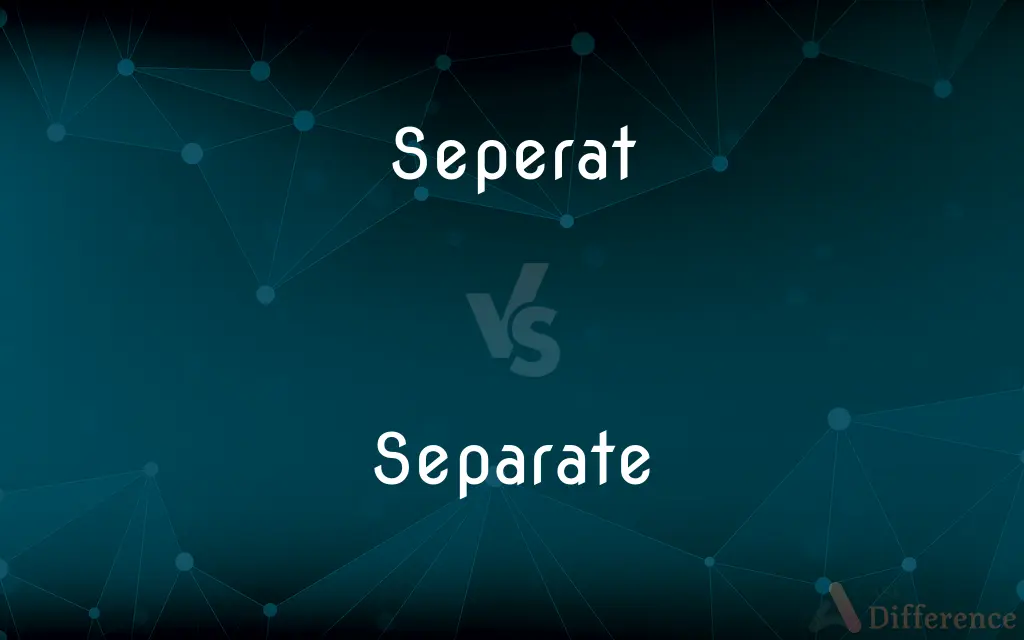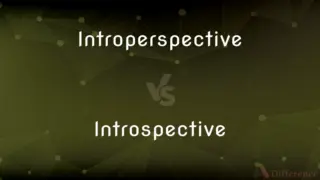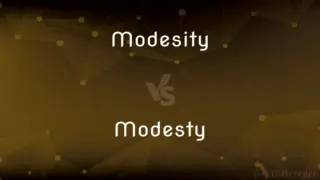Seperat vs. Separate — Which is Correct Spelling?
Edited by Tayyaba Rehman — By Fiza Rafique — Updated on March 25, 2024
"Seperat" is an incorrect spelling. The correct spelling is "Separate," which means to set or keep apart.

Table of Contents
Which is correct: Seperat or Separate
How to spell Separate?

Seperat
Incorrect Spelling

Separate
Correct Spelling
ADVERTISEMENT
Key Differences
Associate "separate" with "desperate," which also has "par" in it.
Recall the phrase "a separate piece" to emphasize the "a" in "separate."
Remember "par" in the middle, as in "apart."
Link "sep-A-rate" with "A" for Apart.
Visualize two things being set apart to solidify "separate."
ADVERTISEMENT
How Do You Spell Separate Correctly?
Incorrect: Can you help me seperat the recycling from the trash?
Correct: Can you help me separate the recycling from the trash?
Incorrect: The teacher asked us to seperat the colored pencils by shade.
Correct: The teacher asked us to separate the colored pencils by shade.
Incorrect: We need to seperat the two groups into different rooms.
Correct: We need to separate the two groups into different rooms.
Incorrect: She couldn't find a way to seperat her personal and professional life.
Correct: She couldn't find a way to separate her personal and professional life.
Incorrect: It's important to seperat facts from opinions in this discussion.
Correct: It's important to separate facts from opinions in this discussion
Separate Definitions
Separate means to cause two or more things to be apart.
She decided to separate the laundry by color.
Separate can refer to distinct or different from others.
They live in separate houses.
To set, force, or keep apart
The referee separated the two boxers.
To put space between; space apart or scatter
Small farms that were separated one from another by miles of open land.
To form a border or barrier between (two areas or groups)
A hedge separates the two yards.
To place in different groups; sort
Separate mail by postal zones.
To differentiate or discriminate between; distinguish
A researcher who separated the various ethnic components of the population sample.
To cause to be distinct or different
His natural talent separates him from all the others in the choir.
To remove from a mixture or combination; isolate.
To cause (one person) to stop living with another, or to cause (a couple) to stop living together, often by decree
She was separated from her husband last year. The couple have been separated for a year.
To terminate a contractual relationship with (someone); discharge.
To come apart; become detached
The lining has separated from the inside of the coat.
To withdraw or break away
The state threatened to separate from the Union.
To part company; go away from each other; disperse
The friends separated at the end of the school year.
To stop living together as a couple
They separated after 10 years of marriage.
To become divided into components or parts
Oil and water tend to separate.
Not touching or adjoined; detached
The garage is separate from the house.
Existing or considered as an independent entity
The reference collection is separate from the rest of the library.
Dissimilar from all others; distinct or individual
A cable made of many separate fibers.
Two people who hold separate views on the issue.
Often Separate Having undergone schism or estrangement from a parent body
Separate churches.
A garment, such as a skirt, jacket, or pair of slacks, that may be purchased separately and worn in various combinations with other garments.
A stereo component that is purchased separately and connected to other components as part of a system.
An offprint of an article.
Apart from (the rest); not connected to or attached to (anything else).
This chair can be disassembled into five separate pieces.
(followed by “from”) Not together (with); not united (to).
I try to keep my personal life separate from work.
(transitive) To divide (a thing) into separate parts.
Separate the articles from the headings.
(transitive) To disunite from a group or mass; to disconnect.
(transitive) To cause (things or people) to be separate.
If the kids get too noisy, separate them for a few minutes.
(intransitive) To divide itself into separate pieces or substances.
The sauce will separate if you don't keep stirring.
(obsolete) To set apart; to select from among others, as for a special use or service.
Anything that is sold by itself, especially articles of clothing such as blouses, skirts, jackets, and pants.
(bibliography) A printing of an article from a periodical as its own distinct publication and distributed independently, often with different page numbers.
To disunite; to divide; to disconnect; to sever; to part in any manner.
From the fine gold I separate the alloy.
Separate thyself, I pray thee, from me.
Who shall separate us from the love of Christ?
To come between; to keep apart by occupying the space between; to lie between; as, the Mediterranean Sea separates Europe and Africa.
To set apart; to select from among others, as for a special use or service.
Separate me Barnabas and Saul for the work whereunto I have called thaem.
To part; to become disunited; to be disconnected; to withdraw from one another; as, the family separated.
Divided from another or others; disjoined; disconnected; separated; - said of things once connected.
Him that was separate from his brethren.
Unconnected; not united or associated; distinct; - said of things that have not been connected.
For such an high priest became us, who is holy, harmless, undefiled, separate from sinnere.
Disunited from the body; disembodied; as, a separate spirit; the separate state of souls.
A separately printed article that originally appeared in a larger publication
A garment that can be purchased separately and worn in combinations with other garments
Act as a barrier between; stand between;
The mountain range divides the two countries
Force, take, or pull apart;
He separated the fighting children
Moses parted the Red Sea
Mark as different;
We distinguish several kinds of maple
Separate into parts or portions;
Divide the cake into three equal parts
The British carved up the Ottoman Empire after World War I
Come apart;
The two pieces that we had glued separated
Divide into components or constituents;
Separate the wheat from the chaff
Arrange or order by classes or categories;
How would you classify these pottery shards--are they prehistoric?
Become separated into pieces or fragments;
The figurine broke
The freshly baked loaf fell apart
Make a division or separation
Discontinue an association or relation; go different ways;
The business partners broke over a tax question
The couple separated after 25 years of marriage
My friend and I split up
Go one's own away; move apart;
The friends separated after the party
Treat differently on the basis of sex or race
Divide into two or more branches so as to form a fork;
The road forks
Independent; not united or joint;
A problem consisting of two separate issues
They went their separate ways
Formed a separate church
Individual and distinct;
Pegged down each separate branch to the earth
A gift for every single child
Standing apart; not attached to or supported by anything;
A freestanding bell tower
A house with a separate garage
Not living together as man and wife;
Decided to live apart
Maintaining separate households
They are separated
Characteristic of or meant for a single person or thing;
An individual serving
Separate rooms
Single occupancy
A single bed
Separated according to race, sex, class, or religion;
Separate but equal
Girls and boys in separate classes
Have the connection undone; having become separate
Separate signifies not connected or related.
Work and personal life should be separate.
Separate can describe something that's detached or isolated.
The garage is separate from the house.
Separate may also mean to classify or sort different items.
Separate the apples from the oranges.
Separate Meaning in a Sentence
I use a drawer organizer to separate my socks from my underwear.
It's difficult to separate my work life from my home life.
We should separate the raw meat from the vegetables in the fridge.
The river serves to separate the two cities.
They used a fence to separate their property from the neighbor's.
Can you separate the good apples from the bad ones?
The teacher asked them to separate into groups of four.
She used a curtain to separate the room into two areas.
He tried to separate the fighting puppies.
To bake the cake, first separate the eggs.
Please separate the papers into two piles: keep and recycle.
The bookshelf is used to separate the living room from the dining area.
They decided to separate after ten years of marriage.
Separate the laundry by color to avoid ruining your clothes.
The new policy will separate the advanced learners from the beginners.
You need to separate your feelings from the facts in this case.
Use a strainer to separate the pasta from the water.
It's hard to separate true friends from false ones.
After the argument, they decided to separate for a while.
Can we separate the discussion into more manageable parts?
It's wise to separate your personal finances from your business finances.
Separate seating areas were created for families at the event.
Separate your waste to improve recycling.
Separate Idioms & Phrases
A separate peace
Finding personal happiness or contentment independent of the surrounding situation.
After years of conflict, he made a separate peace with the past.
Go our separate ways
To part ways or end a relationship or partnership.
After college, we all went our separate ways.
Common Curiosities
What is the verb form of Separate?
Separate (as in "to separate").
What is the root word of Separate?
The Latin word "separatus."
Why is it called Separate?
The term originates from Latin "separatus," meaning "to divide or detach."
What is the pronunciation of Separate?
/ˈsɛp.ə.reɪt/ for the adjective and /ˈsɛp.ə.reɪt/ for the verb.
Which preposition is used with Separate?
"From" as in "separate from."
What is the plural form of Separate?
Separates.
Is Separate an abstract noun?
No.
Which vowel is used before Separate?
Vowels like "a" or "the" can precede it depending on the context.
Is Separate a noun or adjective?
It's primarily a verb and an adjective, but it can also be a noun in contexts like "a separate."
What is the singular form of Separate?
Separate.
Which article is used with Separate?
"A" or "the," depending on context.
Is Separate a negative or positive word?
Neutral, context-dependent.
Is Separate a countable noun?
Not when used as a noun.
Which conjunction is used with Separate?
Any conjunction can be used, depending on the sentence.
Which determiner is used with Separate?
Determiners like "this," "that," "each" can be used.
Is Separate a vowel or consonant?
"Separate" is a word containing both vowels and consonants.
Is the word Separate a Gerund?
No, but "separating" is.
Is the word “Separate” a Direct object or an Indirect object?
It can be a direct object, as in "She wants to separate the two."
What is the first form of Separate?
Separate.
Is Separate an adverb?
No.
Is Separate a collective noun?
No.
Is the Separate term a metaphor?
It can be used metaphorically.
How do we divide Separate into syllables?
Sep-a-rate.
What part of speech is Separate?
Verb and adjective, occasionally a noun.
What is another term for Separate?
Divide, partition.
How many syllables are in Separate?
Three syllables.
What is a stressed syllable in Separate?
The first syllable, "Sep."
What is the second form of Separate?
Separated.
What is the third form of Separate?
Separated.
Is the word Separate imperative?
It can be, as in "Separate these files."
What is the opposite of Separate?
Combine, unite.
How is Separate used in a sentence?
"We need to separate the recyclables from the trash."
Share Your Discovery

Previous Comparison
Introperspective vs. Introspective
Next Comparison
Modesity vs. ModestyAuthor Spotlight
Written by
Fiza RafiqueFiza Rafique is a skilled content writer at AskDifference.com, where she meticulously refines and enhances written pieces. Drawing from her vast editorial expertise, Fiza ensures clarity, accuracy, and precision in every article. Passionate about language, she continually seeks to elevate the quality of content for readers worldwide.
Edited by
Tayyaba RehmanTayyaba Rehman is a distinguished writer, currently serving as a primary contributor to askdifference.com. As a researcher in semantics and etymology, Tayyaba's passion for the complexity of languages and their distinctions has found a perfect home on the platform. Tayyaba delves into the intricacies of language, distinguishing between commonly confused words and phrases, thereby providing clarity for readers worldwide.


































